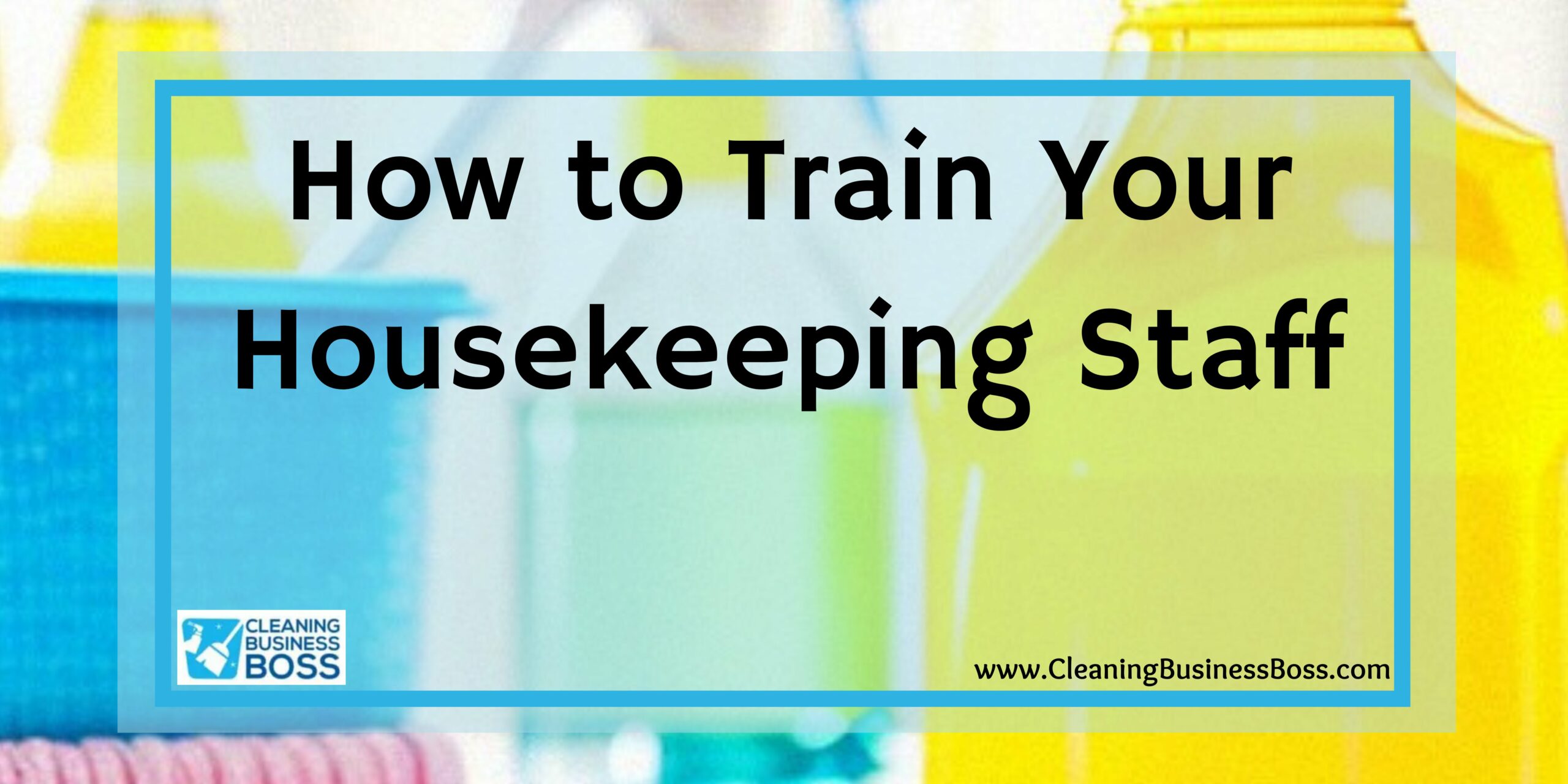If you’re reading this, odds are you’ve made it to (or are at least close to) the next step in your housekeeping business venture: Having employees. This is good because it means your business is expanding. The upside is, you are not the only employee anymore. You can delegate work. The downside is there’s another factor that can determine your business’ success. More moving parts means more opportunities for errors. If an employee makes an error, that reflects badly on your business as a whole. The best way to avoid these errors is to train your staff properly. I will give you some tips on how to do this.
To best train your housekeeping staff:
- Be clear about your expectations.
- Pair experienced employees with new employees.
- Focus on results, not methods
- Train in person
- Don’t forget skills outside of cleaning
- Train Often
- Use positive Reinforcement
Be Clear About Your Expectations
One of the first things you need to do with any employee is to state your expectations of your employees clearly and answer any questions they may have. I include any questions you may think are just plain common sense in that statement. Problems can often result from misunderstandings. If an employee has a question, it’s best to answer it even if it is a “stupid question.”
You should also encourage your employees to ask questions. If one employee has a question about your expectations, chances are at least one other employee has a similar question. It’s better to spend a few minutes answering a simple question than trying to retain a customer after a botched job. In the age of social media and locally-targeted Internet review sites, word of a botched job can travel fast. Spending the time to answer questions at a meeting or in an e-mail is a vital time investment.
You’ll need to be consistent about your expectations. It’s one thing to alter your expectations as new situations arise. It’s another thing to change the rules on a dime. The former is understandable. The latter creates an environment that is unpleasant to work in and creates a high rate of employee turnover.
Small businesses need experienced employees. If you drive them off by changing your expectations on the daily basis, you’ll have to train a new staff constantly and word will eventually get around that you’re not good to work for. This will make it hard to attract good talent.
The other thing to remember is to enforce your expectations. No one likes being the bad guy but if you set the expectations, you have to make sure the employees meet them. That doesn’t mean you should fire an employee for any minor thing, but the staff needs to know that being fired is on the table for consistently poor performance. If employees who don’t measure up aren’t held accountable, it demotivates good employees.
Check out this article to learn how to clean a room of a hotel.
Pair Experienced Employees with New Employees

If you only have one new employee, you can take them out and train them personally. As you get more employees, this becomes less practical. Chances are you’ll have to stay at the office to deal with office-related things like invoices and tax forms.
In this case, your more experienced employees will be able to fill the void. You should reward the employees doing the training. Of course, you should make sure that the training is up to your standards.
Training is also a good experience for the more experienced employee. It helps build their communication skills and helps them further their careers. Being a trainer looks good on a resume and you can use that as a selling point to get employees to volunteer.
Focus on Results, Not Method
One mistake employers in all sectors often make is that they think a task must be done their way and if a task is done any other way, it was done wrong and they berate the employee for not doing their specific way.
There are times and businesses where this might make sense, such as food preparation. Cleaning has more flexibility. A lot of people grew up in homes that used different cleaning methods. People will often take those methods with them to their housekeeping job.
It’s important to teach them multiple methods but if the method they brought with them works for them and gets the job done efficiently, let it go. Housecleaning is a hard job and chewing out an employee for no reason is a morale killer.
Be open to learning things yourself. You never know when a new employee’s cleaning method could be better than the one you were brought up with.
Train in Person

There are some jobs in which things like sending manuals in an e-mail or a YouTube video is an appropriate way to train employees. Housekeeping isn’t of them.
While giving manuals and YouTube videos can be good introductory training, there are some things that you can only learn on the job. If you’re handing off important clients to the new employee, they need to know how to clean for that client. They’ll need to spend time on the jobs learning the ins and outs of the places they’ll be cleaning. They’ll also need to see your standard procedures for dealing with customers.
You can’t forget about the needs of your client. If you’re going to send them a new employee, your client has to meet them. You can’t just have the new person walk up to their door and say they’re the new housecleaner now. People who need house cleaners often have valuable things that they don’t want to be stolen.
Others have physical impairments and are vulnerable so they won’t let anyone in the house that they don’t personally trust. As an employer, your job will be to help your new employee and your client meet so they know they can trust each other. This is one reason to train in person.
Odds are also good that you’ll be using specialized software to do things like keep track of hours worked. Some of the instructions for this software can be hard to understand and I find that seeing software demonstrated in person helps more than e-mails.
Train Soft Skills
The housekeeping business is about more than cleaning. There’s a lot of customer service skills involved. You have to train your employees to be professional yet personable. No one wants to hire a grumpy housekeeper. No one wants to hire someone who doesn’t take their job seriously either. You want someone who can make customers feel at ease and feel like they can have them back over.
Depending on the job, you’ll also need to emphasize teamwork. Some houses and businesses are too big for one employee to clean. You’ll need to make sure your team of cleaners has the communication skills to work quickly and efficiently.
You should emphasize discretion as well. Part of a housekeeper’s job is going into a customer’s private space. They will probably learn things that the homeowners want to be kept secret. Your employees must learn to keep these secrets. If they cannot, then you need to find other employees.
Check out this article to learn some of the best electrostatic sprayers that you can buy.
Train Often
Sometimes, as people get good at a job, they get complacent and go through the motions of doing a job. This is by no means restricted to employees. Employers can become complacent too. It’s important to do periodic training so that you and your team’s skills are polished up. These training sessions can also be used to demonstrate new equipment or software,
Just remember to schedule your training sessions around your customers. No one likes having their housekeeper cancel on them because they have to go to training.
Use Positive Reinforcement

While you sometimes have to put your foot down, you should try to make negative interactions with your employees rare. Sometimes, employees, particularly new ones, simply need to be guided in the right direction. People are often more receptive to positive reinforcement than yelling and screaming.
Positive reinforcement is better for morale too. If you’ve ever worked in a place where the boss’ primary modes of communication vary between yelling and sarcasm, you know it’s not a great place to work. Everyone is stressed, no one wants to do their best, and everyone is looking for the first chance to change jobs.
To have the best workplace, you need to make sure you reward good performance.
Frequently Asked Questions
How should I promote my business?
Depends on your budget. You may not have money for big-budget commercials. However, the Internet has limitless marketing opportunities- if you use it wisely. Sites like Facebook and Twitter are a good way to promote your business. You can also look into sites like Nextdoor.com for more targeted marketing.
You can also look into organizations that work with the elderly and the disabled.
Should I promote competitions among my employees with special bonuses to help boost productivity?
Competitions can be a good method for positive reinforcement. The trouble is that they can sometimes (but not always) go too far. There’s a chance people will take shortcuts that lower the quality of the work. Conflicts in the workplace can also result. While you shouldn’t rule out contests entirely, you should use them sparingly and be willing to call them off if they become counterproductive.
To learn more on how to start your own cleaning business, check out my startup documents here.
Please note that the contents of this blog are for informational and entertainment purposes only and should not be construed as legal advice. Any action taken based on the information provided in this blog is solely at your own risk. Additionally, all images used in this blog are generated under the CC0 license of Creative Commons, which means they are free to use for any purpose without attribution.

About the author. Entrepreneur and Cleaning Business Fan.
Hi! I am Shawn and I am a happy individual who happens to be an entrepreneur. I have owned several types of businesses in my life from a coffee shop to an import and export business to an online review business plus a few more and now I create online cleaning business resources for those interested in starting new ventures. It’s demanding work but I love it. I do it for those passionate about their business and their goals. That’s why when I meet a cleaning business owner, I see myself. I know how hard the struggle is to retain clients, find good employees and keep the business growing all while trying to stay competitive.
That’s why I created Cleaning Business Boss: I want to help cleaning business owners like you build a thriving business that brings you endless joy and supports your ideal lifestyle.


